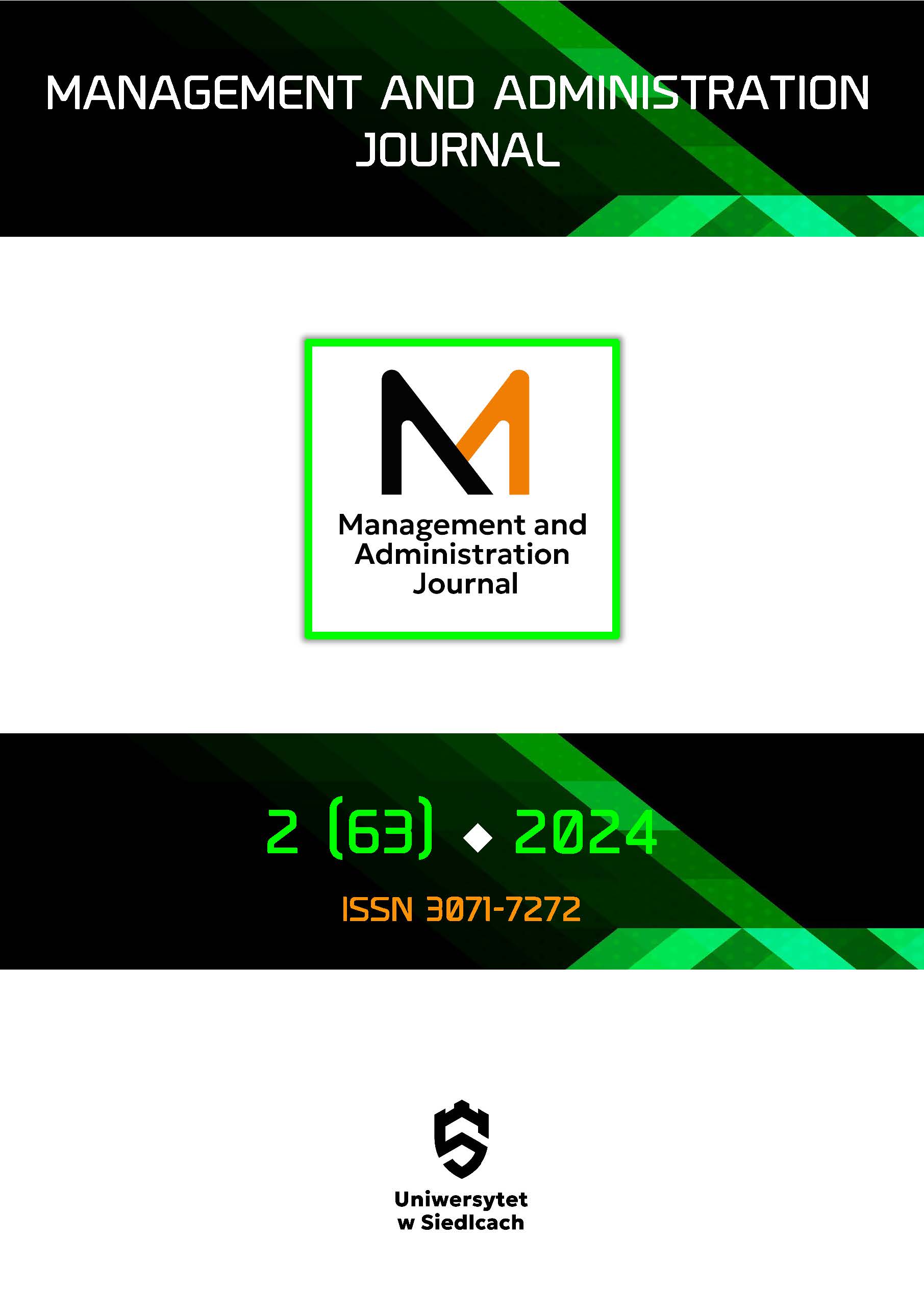THE ROLE OF PHYSICAL ACTIVITY IN DEVELOPING STUDENTS' SOCIAL WELL-BEING
DOI:
https://doi.org/10.34739/maj.2024.02.10Keywords:
health awareness, health literacy, health costs, student research, socioeconomic situation, system supportAbstract
Health Literacy, or health awareness, is an essential competency for individuals in the 21st century. It enables the understanding of the purpose of preventive, diagnostic, and therapeutic actions, which translates into greater control over one's health. Taking care of personal health awareness is an investment in health that benefits both individuals and society as a whole. Therefore, studying health literacy among students, who are responsible for their own lives and will also influence
the lives of others, is an important topic. The article aims to analyze global research on the topic of Health Literacy among students. The reviewed studies provide strong evidence of the relationship between health literacy and factors such as age, semester of study, gender, field of study, parental education, and socioeconomic status. Other potential determinants may include access to information, health-related experiences, financial situation, and social support. Limited health literacy poses a significant challenge to health policy and education worldwide, albeit to varying degrees in different countries. Research should draw conclusions about which groups require systemic support to enhance their health literacy.
Downloads
References
Bánfai-Csonka, H., Bánfai, B., Jeges, S., Betlehem, J. (2022). Understanding Health Literacy among University Health Science Students of Different Nationalities. Int. J. Environ. Res. Public Health (19), 11758. DOI:10.3390/ ijerph191811758.
Birimoglu Okuyan, C., Caglar, S. (2019). Investigation of health literacy levels and health perceptions of nursing students: a cross-sectional study. Int J Caring Sci. (12), 270-279. http://www. internationaljournalofcaringsciences.org/docs/30_biri-moglu_original_ 12-1_1.pdf.
Budhathoki, S.S., Pokharel, P.K., Jha, N., Moselen, E., Dixon, R., Bhattachan, M., et al. (2019). Health literacy of future healthcare professionals: a cross-sectional study among health sciences students in Nepal. Int Health. (11), p. 15-23. DOI:10.1093/inthealth/ihy090.
Elsborg, L., Krossdal, F., Kayser, L. (2017). Health literacy among Danish university students enrolled in health-related study programmes. Scand J Public Health (45), 831-838. DOI:10.1177/1403494817733356.
Göring, A., Rudolph, S. (2015). Die Gesundheitskompetenz von Studierenden in Abhängigkeit von sportlicher Aktivität. in: A. Göring, D. Möllenbeck (Eds.) Bewegungsorientierte Gesundheitsförderung an Hochschulen. Göttingen: Universitätsverlag Göttingen (pp. 147-165). DOI:10.17875/gup2015-811.
Iwanowicz, E. (2009). „Health Literacy” współczesnym wyzwaniem zdrowia publicznego [„Health Literacy” as one Contempo-rary Public Health Challenges]. Medycyna Pracy 60(5), 427-437. http://medpr.imp.lodz.pl.
Kaboudi, M., Kianipou, N., Ziapour, A., Dehngan, F. (2017). A study of health literacy components and their relationship with health-promotin behaviors among students at kermanshah university of medical sciences in 2017. Int J Pediatr. (5), 6721-6729. DOI: 10.22038/ijp.2017.26823.2313.
Korzeniowska, E. (1997). Zachowania i świadomość zdrowotna w sferze pracy (pp. 50-61). [Health behaviour and Health Lite-racy in the sphere of work]. Łódź: Instytut Medycyny Pracy im. Prof. Dra Med. Jerzego Nofera. Krajowe Centrum Promocji Zdrowia w Miejscu Pracy.
Kühn, L., Bachert, Ph., Hildebrand, C., Kunkel, J., Reitermayer, J.,Wäsche, H., Woll, A. (2021). Health Literacy Among University Students: A Systematic Review of Cross-Sectional Studies, Sec. Public Health Education and Promotion (9). DOI:10.3389/ fpubh.2021.680999.
Kushalnagar, P., Ryan, C., Smith, S., Kushalnagar, R. (2018). Critical health literacy in American deaf college students. Health Promot Int. (33), 827-833. DOI:10.1093/heapro/dax022.
Levin-Zamir, D., Peterburg, Y. (2001). Health literacy in health systems: perspectives on patient self management in Israel. Health Promot. Int. (16), 87-94.
Mullan, J., Burns, P., Weston, K., McLennan, P., Rich, W., Crowther, S., et al. (2017) Health literacy amongst health professional university students: a study using the health literacy questionnaire. Education Sciences (7) 54. DOI: 10.3390/educsci7020054.
Nutbeam, D., (2000). Health literacy as a public health goal: a challenge for contemporary health education and communication strategies into 21st century. Health Promot. Int. (15), 259-267.
Nutbeam, D. (1998). Health promotion glossary. Health Promot. Int. (13) 349-364.
Rababah, J.A., Al-Hammouri, M.M., Drew, B.L., Aldalaykeh, M. (2019). Health literacy: exploring disparities among college students. BMC Public Health (19). DOI:10.1186/s12889-019-7781-2.
Reick, S., Hering, T. (2018). Health literacy of students. Results of an online survey at the Bochum health university (Germany) /Gesundheitskompetenz Studierender – Ergebnisse einer Online-Befragung an der Hochschule für Gesundheit Bochum. Int. J. Health (5), 44-52. DOI:10.2478/ijhp-2018-0007.
Runk, L., Durham, J., Vongxay, V., Sychareun, V. (2016). Measuring health literacy in university students in Vientiane, Lao PDR. Health Promot Int. (32), 360-368. DOI:10.1093/heapro/daw087.
Santos, P., Sa, L., Couto, L., Hespanhol, A.P. (2018). Sources of information in health education: a cross-sectional study in Portuguese university students. Med Stud J Aust. 11. DOI:10.21767/AMJ.2018.3435.
Schricker, J., Rathmann, K., Dadaczynski, K. (2019). Soziale Unterschiede in der gesundheitskompetenz von studierenden: ergebnisse einer online-studie an der technischen universität dortmund. Prävention und Gesundheitsförderung (15) 8-14. DOI: 10.1007/s11553-019-00731-6.
Schultes, K. (2017). Gesundheitskompetenz, subjektive Gesundheit und Gesundheitsverhalten bei Studierenden. Public Health Forum (25), 84-86. DOI: 10.1515/pubhef-2016-2115.
Simonds, S.K. (1974). Health education as social policy. Health Educ. Monogr. (2), 1-25.
Sørensen, K., Pelikan, J., Röthlin, F., Ganahl, K., Slonska, Z., Doyle, G., Fullam, J., Kondilis, B., Agrafiotis, D., Uiters, E., Falcon, M., Mensing, M., Tchamov, K., van den Broucke, S. (2015). Brand on behalf of the HLS-EU Consortium. European Journal of Public Health (25) 6, 1053-1058. DOI:10.1093/eurpub/ckv043.
Sorensen, K., Van den Broucke, S. Pelikan, J. (2013). Measuring health literacy in populations: illuminating the design and development process of HLS-EU-Q. BMC Public Health (13) 948.
Sukys, S., Cesnaitiene, V.J., Ossowsky, Z.M. (2017). Is Health Education at University Associated with Students’ Health Literacy? Evidence from Cross-Sectional Study Applying HLS-EU-Q. BioMed Research International (2017) 1-9. DOI: 10.1155/2017/ 8516843.
Suri, V.R., Majid, S., Chang, Y.K., Foo, S. (2016). Assessing the influence of health literacy on health information behaviors: a multi-domain skills-based approach. Patient Educ Couns. (99), 1038-45. DOI: 10.1016/j.pec.2015.12.017.
Vamos, S., Yeung, P., Bruckermann, T., Moselen, E.F., Dixon, R., Osborne, R.H. (2016). Exploring health literacy profiles of Texas university students. Health Behavior and Policy Review (3) 209-225. DOI: 10.14485/HBPR.3.3.3.
Downloads
Published
Issue
Section
License
Copyright (c) 2024 Management and Administration Journal

This work is licensed under a Creative Commons Attribution-NonCommercial 4.0 International License.





